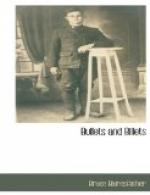The reason is not far to seek. There is something very attractive to artillery about houses. They can range on them well, and they afford a more definite target than an open trench. Besides, if you can spot a house that contains, say, half a dozen to a dozen people, and just plop a “Johnson” right amidships, it generally means “exit house and people,” which, I suppose, is a desirable object to be attained, according to twentieth century manners.
However, we had decided to live in the house, but as I crept back from the wood, I determined to take a few elementary and common-sense precautions. Hudson had returned when I got back, and together we discussed the house, the position, and everything we could think of in connection with the business, as we sat on the floor and had our midday meal of bully beef and biscuits, rounded up by tea and plum and apple jam spread neat from the tin on odd corners of broken biscuits. We thoroughly talked over the question of possible fortifications and precautions. I said, “What we really want is an emergency exit somewhere, where we can stand a little chance, if they start to shell us.”
He agreed, and we both decided to pile up all the odd bricks, which were lying outside at the back of the house, against the perforated wall, and then sleep there in a little easier state of mind. We contented ourselves with this little precaution to begin with, but later on, as we lived in that house, we thought of larger and better ideas, and launched out into all sorts of elaborate schemes, as I will show when the time comes.
Anyway, for the first couple of sessions spent in that house in St. Yvon, we were content with merely making ourselves bullet proof. The whole day had to be spent with great caution indoors; any visit elsewhere had to be conducted with still greater caution, as the one great thing to be remembered was “Don’t let ’em see we’re in the village.” So we had long days, just lying around in the dirty old straw and accumulated dirt of the cottage floor.
We both sat and talked and read a bit, sometimes slept, and through the opening beneath the sack across the back door we watched the evenings creeping on, and finally came the night, when we stole out like vampires and went about our trench work. It was during these long, sad days that my mind suddenly turned on making sketches. This period of my trench life marked the start of Fragments from France, though it was not till the end of February that a complete and presentable effort, suitable for publication in a paper, emerged. It was nothing new to me to draw, as for a very long time before the war I had drawn hundreds of sketches, and had spent a great amount of time reading and learning about all kinds of drawing and painting. I have always had an enormous interest in Art; my room at home will prove that to anyone. Stacks of bygone efforts of mine will also bear testimony to this. Yet it was not




